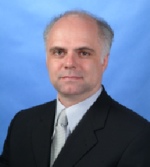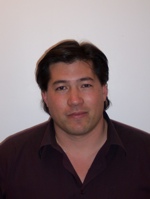About This Blog
The Collective Imagination is designed to explore some of the most compelling issues facing the world today and the ways that science and technology can help us address them. A changing cast of ScienceBlogs bloggers and GE scientists will work collaboratively to explore security and personal surveillance technology, the AIDS crisis, and the infrastructure and transmission of energy, among other topics. The blog is sponsored by GE, with all editorial content overseen by ScienceBlogs editors.
Profile
 Greg Laden is a blogger, writer and independent scholar who occassionally teaches. He has a PhD from Harvard in Archaeology and Biological Anthropology, as well as a Masters Degree in the same subjects. He is a biological anthropologist, but for many years before going to graduate school to study human evolution, he did archaeology in North America. He thinks of himself as a biologist who focuses on humans (past and present) and who uses archaeology as one of the tools of the trade. Greg blogs regularly on ScienceBlogs at http://www.scienceblogs.com/gregladen/.
Greg Laden is a blogger, writer and independent scholar who occassionally teaches. He has a PhD from Harvard in Archaeology and Biological Anthropology, as well as a Masters Degree in the same subjects. He is a biological anthropologist, but for many years before going to graduate school to study human evolution, he did archaeology in North America. He thinks of himself as a biologist who focuses on humans (past and present) and who uses archaeology as one of the tools of the trade. Greg blogs regularly on ScienceBlogs at http://www.scienceblogs.com/gregladen/.
Profile
 Dr. Joseph J. Salvo attended Phillips Andover Academy, received his A.B. degree from Harvard University and his Master and Ph.D. degrees in Molecular Biophysics and Biochemistry from Yale University. Dr. Salvo joined the GE Global Research Center in 1988. His early work focused on the development of genetically modified bacteria and fungus, for the production of novel high performance polymers. In the mid 1990's he turned his group's efforts towards developing large-scale internet-based sensing arrays to manage and oversee
business systems. Most recently, he and his team have developed a number of complex decision engines that deliver customer value through system transparency and knowledge-based computational algorithms. Commercial business implementations of his work are currently active in Europe, and Asia as well as North and South America.
Dr. Joseph J. Salvo attended Phillips Andover Academy, received his A.B. degree from Harvard University and his Master and Ph.D. degrees in Molecular Biophysics and Biochemistry from Yale University. Dr. Salvo joined the GE Global Research Center in 1988. His early work focused on the development of genetically modified bacteria and fungus, for the production of novel high performance polymers. In the mid 1990's he turned his group's efforts towards developing large-scale internet-based sensing arrays to manage and oversee
business systems. Most recently, he and his team have developed a number of complex decision engines that deliver customer value through system transparency and knowledge-based computational algorithms. Commercial business implementations of his work are currently active in Europe, and Asia as well as North and South America.
 Dr. Peter Tu received his undergraduate degree in Systems Design Engineering from the University of Waterloo, Canada, and his doctorate from Oxford University England.
In 1997, he joined the Visualization and Computer Vision Group at the GE Global Research Center in Niskayuna, NY. He has developed algorithms for the FBI Automatic Fingerprint Identification System. He is the principle investigator for the ReFace program, which has the goal of automatically computing the appearance of a person’s face from skeletal remains. Dr. Tu has also developed a number of algorithms for the precise measurement of specular and high curvature objects. His current focus is the development of intelligent video algorithms for surveillance applications.
Dr. Peter Tu received his undergraduate degree in Systems Design Engineering from the University of Waterloo, Canada, and his doctorate from Oxford University England.
In 1997, he joined the Visualization and Computer Vision Group at the GE Global Research Center in Niskayuna, NY. He has developed algorithms for the FBI Automatic Fingerprint Identification System. He is the principle investigator for the ReFace program, which has the goal of automatically computing the appearance of a person’s face from skeletal remains. Dr. Tu has also developed a number of algorithms for the precise measurement of specular and high curvature objects. His current focus is the development of intelligent video algorithms for surveillance applications.
Please visit From Edison's Desk, which is Peter's home blog at GE Global Research.
Recent Comments
Search
Recent Posts
Archives
October 31, 2009
"From the calls we're getting, as well as our own experience in the past with all Microsoft's operating systems, we're recommending that people stick with their time-tested OS and wait for the dust to settle," said Josh Kaplan, president of...
Read on »
Posted by Greg Laden at 4:00 PM • 10 Comments • 0 TrackBacks
Category: robots
When you kick over a garbage can, it doesn't make a pure, musical tone. That's why the sound is so hard to synthesize. But now Cornell computer scientists have developed a practical method to generate the crashing and rumbling sounds...
Read on »
Posted by Greg Laden at 12:07 PM • 0 Comments • 0 TrackBacks
As we rush to purchase Apple products and services on Cupertino's monochrome treadmill of shiny shiny I can't help thinking the open web community is losing something vital - a commitment to net neutrality and platform openness. If a single...
Read on »
Posted by Greg Laden at 8:50 AM • 0 Comments • 0 TrackBacks
October 28, 2009
Category: Digital security
When it comes to robots and security the first image that comes to mind is the formidable Robocop followed by a Linda Hamilton-esque sermon on the evils/hubris of scientists and their ilk (reference to Terminator 2). My feeling is that...
Read on »
Posted by Peter Tu at 10:44 AM • 0 Comments • 0 TrackBacks
October 26, 2009
Category: robots
When a person attempts to move, nerve signals are sent from the brain to the muscles via motoneuron, moving the musculoskeletal system as a consequence. At this moment, very weak biosignals can be detected on the surface of the skin....
Read on »
Posted by Greg Laden at 3:52 PM • 1 Comments • 0 TrackBacks
Like the airbags in your car, a substantial amount of IT time and resources go into preventative and protective tasks. Things like security, compliance, business continuity and disaster recovery (BC/DR) that, while imperative, aren't necessarily producing any direct ROI,...
Read on »
Posted by Greg Laden at 1:30 PM • 0 Comments • 0 TrackBacks
A new report by a Washington policy think tank dismisses out of hand the idea that terrorist groups are currently launching cyber attacks and says that the recent attacks against U.S. and South Korean networks were not damaging enough to...
Read on »
Posted by Greg Laden at 12:50 PM • 0 Comments • 0 TrackBacks
October 25, 2009
It is only a matter of time ......
Read on »
Posted by Greg Laden at 1:28 PM • 0 Comments • 0 TrackBacks
October 24, 2009
Category: OpenSource
Having the public write code may seem like a security risk, but it's just the opposite, experts inside and outside the government argued. Because programmers collaborate to find errors or opportunities to exploit Web code, the final product is therefore...
Read on »
Posted by Greg Laden at 9:51 PM • 3 Comments • 0 TrackBacks
Over 800 Nigerian Spamming operations were shut down, and dozens of members of 18 different spamming syndicates arrested, in a major dragnet in Nigeria....
Read on »
Posted by Greg Laden at 1:20 PM • 2 Comments • 0 TrackBacks

 Greg Laden is a blogger, writer and independent scholar who occassionally teaches. He has a PhD from Harvard in Archaeology and Biological Anthropology, as well as a Masters Degree in the same subjects. He is a biological anthropologist, but for many years before going to graduate school to study human evolution, he did archaeology in North America. He thinks of himself as a biologist who focuses on humans (past and present) and who uses archaeology as one of the tools of the trade. Greg blogs regularly on ScienceBlogs at http://www.scienceblogs.com/gregladen/.
Greg Laden is a blogger, writer and independent scholar who occassionally teaches. He has a PhD from Harvard in Archaeology and Biological Anthropology, as well as a Masters Degree in the same subjects. He is a biological anthropologist, but for many years before going to graduate school to study human evolution, he did archaeology in North America. He thinks of himself as a biologist who focuses on humans (past and present) and who uses archaeology as one of the tools of the trade. Greg blogs regularly on ScienceBlogs at http://www.scienceblogs.com/gregladen/. Dr. Joseph J. Salvo attended Phillips Andover Academy, received his A.B. degree from Harvard University and his Master and Ph.D. degrees in Molecular Biophysics and Biochemistry from Yale University. Dr. Salvo joined the GE Global Research Center in 1988. His early work focused on the development of genetically modified bacteria and fungus, for the production of novel high performance polymers. In the mid 1990's he turned his group's efforts towards developing large-scale internet-based sensing arrays to manage and oversee
business systems. Most recently, he and his team have developed a number of complex decision engines that deliver customer value through system transparency and knowledge-based computational algorithms. Commercial business implementations of his work are currently active in Europe, and Asia as well as North and South America.
Dr. Joseph J. Salvo attended Phillips Andover Academy, received his A.B. degree from Harvard University and his Master and Ph.D. degrees in Molecular Biophysics and Biochemistry from Yale University. Dr. Salvo joined the GE Global Research Center in 1988. His early work focused on the development of genetically modified bacteria and fungus, for the production of novel high performance polymers. In the mid 1990's he turned his group's efforts towards developing large-scale internet-based sensing arrays to manage and oversee
business systems. Most recently, he and his team have developed a number of complex decision engines that deliver customer value through system transparency and knowledge-based computational algorithms. Commercial business implementations of his work are currently active in Europe, and Asia as well as North and South America. Dr. Peter Tu received his undergraduate degree in Systems Design Engineering from the University of Waterloo, Canada, and his doctorate from Oxford University England.
In 1997, he joined the Visualization and Computer Vision Group at the GE Global Research Center in Niskayuna, NY. He has developed algorithms for the FBI Automatic Fingerprint Identification System. He is the principle investigator for the ReFace program, which has the goal of automatically computing the appearance of a person’s face from skeletal remains. Dr. Tu has also developed a number of algorithms for the precise measurement of specular and high curvature objects. His current focus is the development of intelligent video algorithms for surveillance applications.
Dr. Peter Tu received his undergraduate degree in Systems Design Engineering from the University of Waterloo, Canada, and his doctorate from Oxford University England.
In 1997, he joined the Visualization and Computer Vision Group at the GE Global Research Center in Niskayuna, NY. He has developed algorithms for the FBI Automatic Fingerprint Identification System. He is the principle investigator for the ReFace program, which has the goal of automatically computing the appearance of a person’s face from skeletal remains. Dr. Tu has also developed a number of algorithms for the precise measurement of specular and high curvature objects. His current focus is the development of intelligent video algorithms for surveillance applications.


